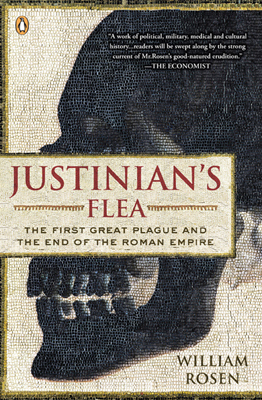"Rigorous, highly informative history, written with passion, panache, and an appealing bit of attitude"
About the Book
In the middle of the 6th century, the world's smallest organism collided with the world's mightiest empire. Twenty-five million corpses later, the Roman Empire, under her last great emperor, Justinian, was decimated. Before Yersinia pestis, the bacterium that carries bubonic plague, was through, both Rome and Persia were easy pickings for the armies of Muhammad on their conquering march out of Arabia. In its wake, the plague – history's first pandemic – marked the end of a multinational imperium and the birth of European nation-states…the transition from antiquity to the medieval world.
Justinian's Flea is the story of that collision, a narrative history that weaves together evolutionary microbiology, architecture, military history, geography, rat and flea ecology, jurisprudence, theology, epidemiology, and the economics of the silk trade. The climax of Justinian's Flea – the summer of 542, when Constantinople witnessed the death of 5,000 of its citizens every day – is revealed through the experiences of the remarkable individuals whose lives are a window onto a remarkable age: Justinian himself, of course, but also his doppelganger, the Persian Shah Khusro Anushirvan, whose empire would be so weakened by plague that it essentially vanished; his general Belisarius, the greatest soldier between Caesar and Saladin, whose conquests marked the end of imperial rule in Italy and Africa; his architect, Anthemius, the mathematician-engineer who built Constantinople's Hagia Sophia (and whose brother, Alexander, was the great physician of the plague years); Tribonian, the jurist who created the Justinianic Code, the source of Europe's tradition of Civil Law; and, finally, his empress Theodora, the one-time prostitute who became co-ruler of the empire, the most politically powerful woman in European history until Elizabeth I.
Melding contemporaneous accounts with modern disciplines as disparate as climatology and economics – the pandemic was equally dependent upon a year-long temperature change that permitted the arrival of Y. pestis at the mouth of the Nile, and upon the huge maritime trade in grain that originated there – Justinian's Flea is a unique account of one of history's great hinge moments.
Justinian's Flea is an alternate selection of the Book-of-the-Month Club, the History Book Club, the Quality Paperback Book Club, the Reader's Subscription, and the Scientific American Book Club
